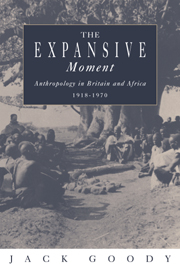Book contents
- Frontmatter
- Contents
- Introduction
- 1 The economic and organisational basis of British social anthropology in its formative period, 1930–1939: social reform in the colonies
- 2 Training for the field: the sorcerer's apprentices
- 3 Making it to the field as a Jew and a Red
- 4 Personal and intellectual friendships: Fortes and Evans-Pritchard
- 5 Personal and intellectual animosities: Evans-Pritchard, Malinowski and others
- 6 The Oxford Group
- 7 Some achievements of anthropology in Africa
- 8 Personal contributions
- 9 Concluding remarks
- Appendix 1 Changing research schemes
- Appendix 2 Towards the study of the history of social anthropology
- Notes
- List of references
- Index
7 - Some achievements of anthropology in Africa
Published online by Cambridge University Press: 30 September 2009
- Frontmatter
- Contents
- Introduction
- 1 The economic and organisational basis of British social anthropology in its formative period, 1930–1939: social reform in the colonies
- 2 Training for the field: the sorcerer's apprentices
- 3 Making it to the field as a Jew and a Red
- 4 Personal and intellectual friendships: Fortes and Evans-Pritchard
- 5 Personal and intellectual animosities: Evans-Pritchard, Malinowski and others
- 6 The Oxford Group
- 7 Some achievements of anthropology in Africa
- 8 Personal contributions
- 9 Concluding remarks
- Appendix 1 Changing research schemes
- Appendix 2 Towards the study of the history of social anthropology
- Notes
- List of references
- Index
Summary
The main thrust of the teaching and research in post-war Oxford was on Africa under the aegis of Evans-Pritchard, Fortes (to 1950), Gluckman (to 1949), Bohannan, Lienhardt and others. It was in that context that theoretical interests were largely, though not exclusively, developed and it was to that continent that the bulk of research students went to carry out their work. In the chapters that follow I want to review rather generally some of the achievements of the generation working under the auspices of the International African Institute, then look at post-war developments concentrating on the area I know best, West Africa, and conclude with some remarks on the impact on my own work.
The attraction of Oxford was twofold: firstly, the staff and the students that had come there over the years from 1937 to 1947, but effectively since the war; secondly, the fact that they were largely Africanists and that that was the continent where major socio-political changes were then taking place, where a cluster of independent nations was to emerge within the next decade and a half, where much ethnological work needed to be done, where contributions to knowledge were rapidly building up and where many contacts had been made as a result of the war, the new research institutions and the burgeoning university systems. Kofi Busia, author of The Position of the Chief in the Modern Political System of the Ashanti (1951), later Prime Minister of Ghana, and Alex Kyerematen, who also made significant contributions to the ethnography of Ghana, were among the student body.
- Type
- Chapter
- Information
- The Expansive MomentThe rise of Social Anthropology in Britain and Africa 1918–1970, pp. 87 - 117Publisher: Cambridge University PressPrint publication year: 1995

